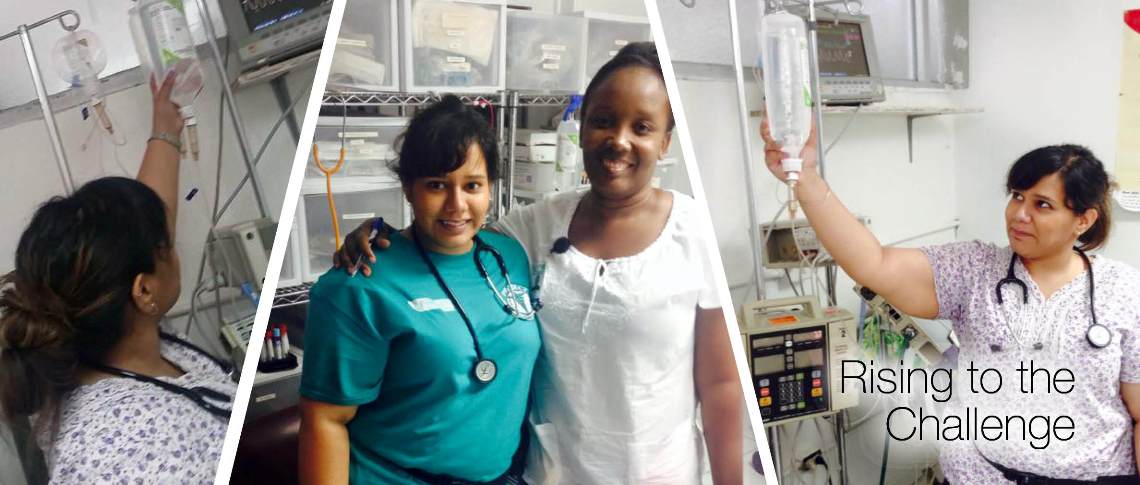

When Robin Minhas, an Intensive Care Unit (ICU) nurse at Rockyview General Hopsital had the opportunity to travel abroad and provide healthcare internationally, she quickly rose to the challenge. Robin, using her vacation time, travelled to Haiti with Medishare and volunteered at the Port au Prince Airport hospital. We sat down with Robin, who was happy to share her experiences.
Why did you choose Haiti?
I picked Haiti because a couple of my friends had already decided on going. That being said, I knew Haiti needed assistance from health professionals, especially after its devastating 2010 earthquake. It has been a couple of years post-disaster and I thought this was the perfect time for me to make a difference.
How was your experience, and would you do it again?
My experience was life-changing. I didn't realize how fortunate I am living in a first-world country and all the resources that come with it. My experience with the locals opened up my perspective on my own beliefs and values.
What I thought was important in my life, and what I thought were priorities for my patients, did not match up with those of the people I met in Haiti. I was humbled by their beliefs and values when caring for their loved ones. Would I do this again? Yes, I would!
What advice would you give someone who wants to become a volunteer nurse?
My advice would be to research the company you are volunteering with and ensure you are working within your scope of practice. I would definitely make sure the company you’re volunteering with is based in Canada so you are practicing to your full scope and covered by your professional license. It will help make your role in patient care more clear.
What did each day typically look like?
For me, a typical day was getting up from a mosquito-netted bunk bed, and then brushing my teeth, not with tap water, but a bottle. From 6:00 am to 6:00 pm, I would be in the ICU caring for a patient. The tasks were similar to those I’d typically perform in the ICU in Calgary.
One difference from Canadian practice was that every hour, I would be required to ask the patient’s family for payment for further blood work/diagnostic testing prior to performing that task. I found this part very challenging, as this would never be part of my job in Canada. I would spend a lot of time running across the ICU to the pharmacy/family waiting area. During that time, I would try to engage with my patient’s family members – and when language was a barrier, I’d rely on body language. By the end of the day, the families would be used to my goofy waves and clumsy running.
We had 30-40 minute breaks for breakfast/lunch where I would catch up on my charting (all paper charting) with help from a translator since it was in French. By 6:00 pm, I would be ready to give a rapid fire report for the night nurse so I could make the bus taking us to the United Nations (UN) Embassy for supper. We'd get an hour at the UN to eat and socialize before the bus would take us back to the hospital. Our evenings would be spent playing cards, listening to music and getting to know other healthcare professionals from all over the world.
What was the most memorable part of the experience?
For me, it was meeting people from all different places. One night, we had a huge downpour and we all relocated to the kitchen area. We spent three hours playing cards with all the hospital staff. Knowing we were there for a common purpose was the most memorable part of the experience.
What were your position duties, and how did that reflect on your expectations?
The position was hands-on and I provided direct patient care in the ICU. I would assess my patients, administer medications, and report any changes as they came. I would also facilitate learning for the patients and families on their healthcare needs. In the end, the role challenged me to rethink my initial expectations, as I had thought I would be providing training and support to local ICU nurses.
Speaking of that, how was your first day?
When we arrived we were oriented to the units and handed our schedule. That was all. There was no orientation to what was expected on each unit and how our roles fit with the local staff. My first day was a disaster! I was placed in the ICU for starters (with no prior experience at this time), had to interpret French, and had to figure out the rhythm of a new setting - it was difficult. The staff also used all my procedural gloves, so I realized I'd have to horde supplies and triage when it was appropriate to use unopened supplies.
I was blessed to be working with physicians and nurses from various American cities who helped me understand my role. By the end of the day, it was easier, but I felt naive with my first six hours. I was also separated from my friends so my coping mechanism to the new stress and environment disappeared. I went to bed really early that first night.
What did your accommodations look like?
It was a hallway, with five rooms. Each room had bunk beds, with typically four to five nurses per room, and a bathroom. The hallway had a large table with multiple chairs that served as our common room. Once during our stay, we enjoyed a day off where we could relax and socialize.
Is there anything you learned while abroad that you bring back to your job today?
Never take the small things for granted. I learned that pre-filled saline syringes aren’t typical in Haiti. I also learned the importance of patient family-centered care, and how cultural beliefs and values influence what this looks like in a particular community.